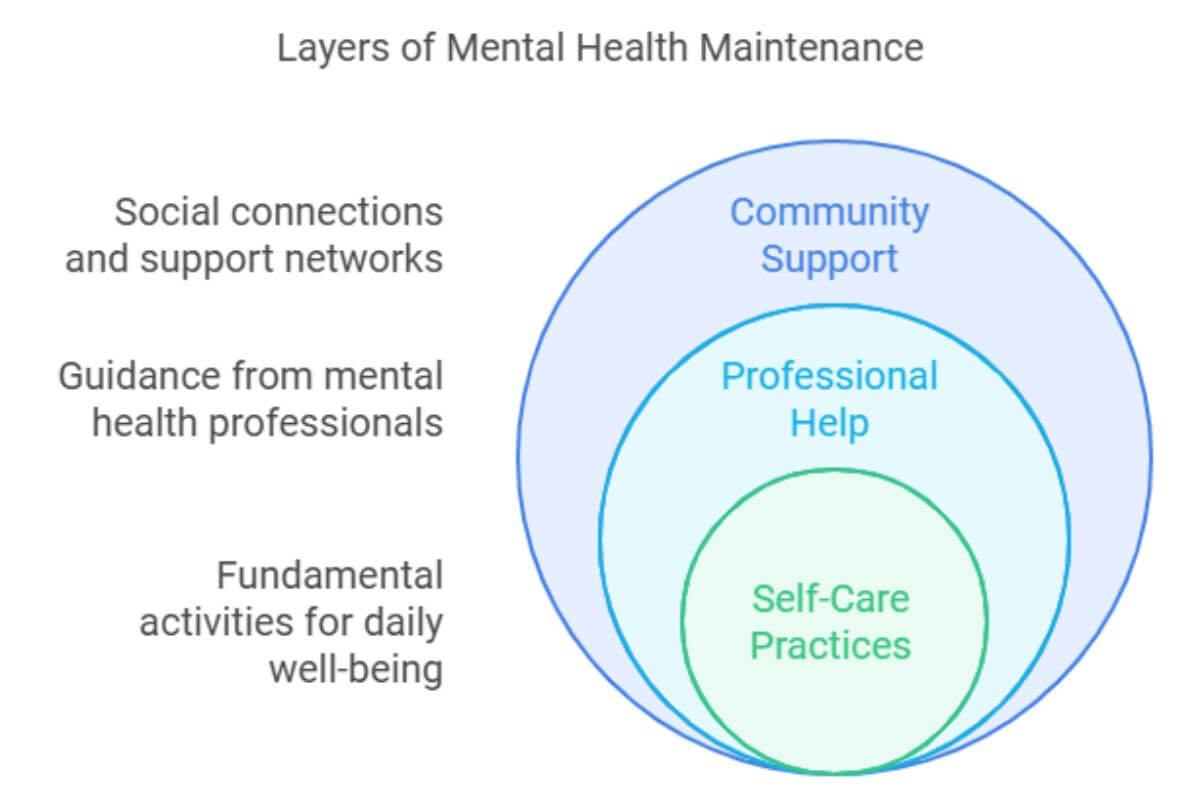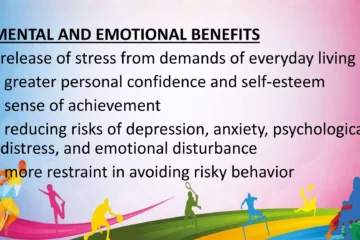Mental health is a crucial aspect of our overall well-being, influencing how we think, feel, and act. It plays a significant role in how we handle stress, relate to others, and make choices in our daily lives. Understanding mental health and learning strategies to maintain it are essential for leading a fulfilling life. In this article, we will explore the concept of mental health, its importance, common mental health disorders, and effective ways to stay mentally healthy.
Understanding Mental Health
Definition of Mental Health
Mental health encompasses our emotional, psychological, and social well-being. It affects how we think, feel, and behave in our everyday lives. Mental health is essential at every stage of life, from childhood and adolescence through adulthood. It involves factors such as:
- Emotional Well-being: The ability to manage emotions and cope with stress.
- Psychological Well-being: The capacity to think critically, make decisions, and solve problems.
- Social Well-being: The ability to form and maintain healthy relationships with others.
The Importance of Mental Health
Mental health is vital for several reasons:
- Quality of Life: Good mental health contributes to a higher quality of life, enabling individuals to enjoy activities, connect with others, and pursue personal goals.
- Physical Health: Mental and physical health are closely linked. Poor mental health can lead to physical health issues, while good mental health can enhance physical well-being.
- Productivity: Individuals with good mental health are typically more productive at work and in their personal lives.
- Resilience: Good mental health helps individuals cope with the challenges and stressors of life, fostering resilience and adaptability.
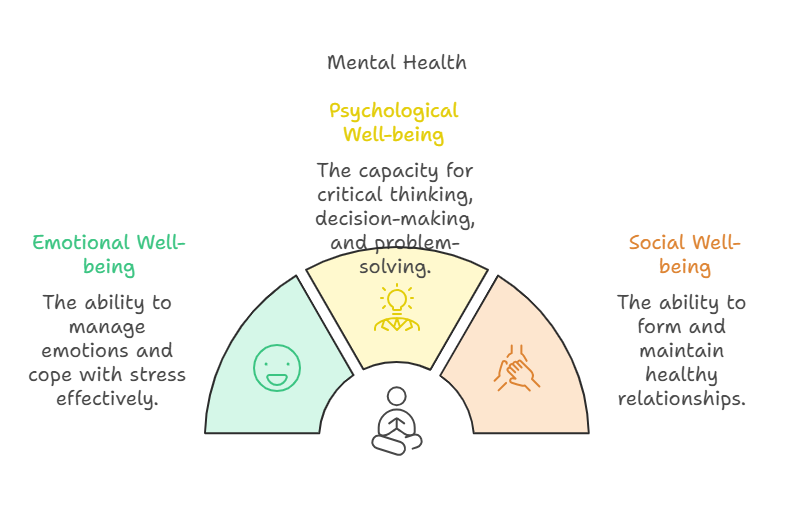
Common Mental Health Disorders
Mental health disorders affect millions of people worldwide. Some of the most common include:
1. Anxiety Disorders
Anxiety disorders encompass a range of conditions, including generalized anxiety disorder (GAD), panic disorder, and social anxiety disorder. Individuals with anxiety disorders often experience excessive fear or worry that interferes with daily activities.
2. Depression
Depression is characterized by persistent feelings of sadness, loss of interest, and a lack of motivation. It can affect anyone and may manifest as major depressive disorder or persistent depressive disorder (dysthymia).
3. Bipolar Disorder
Bipolar disorder involves extreme mood swings, including emotional highs (mania or hypomania) and lows (depression). These mood changes can affect sleep, energy, activity, judgment, and behavior.
4. Schizophrenia
Schizophrenia is a severe mental disorder that affects how a person thinks, feels, and behaves. Individuals with schizophrenia may experience hallucinations, delusions, and disorganized thinking.
5. Eating Disorders
Eating disorders, such as anorexia nervosa, bulimia nervosa, and binge-eating disorder, involve unhealthy eating habits and excessive concern about body weight or shape.
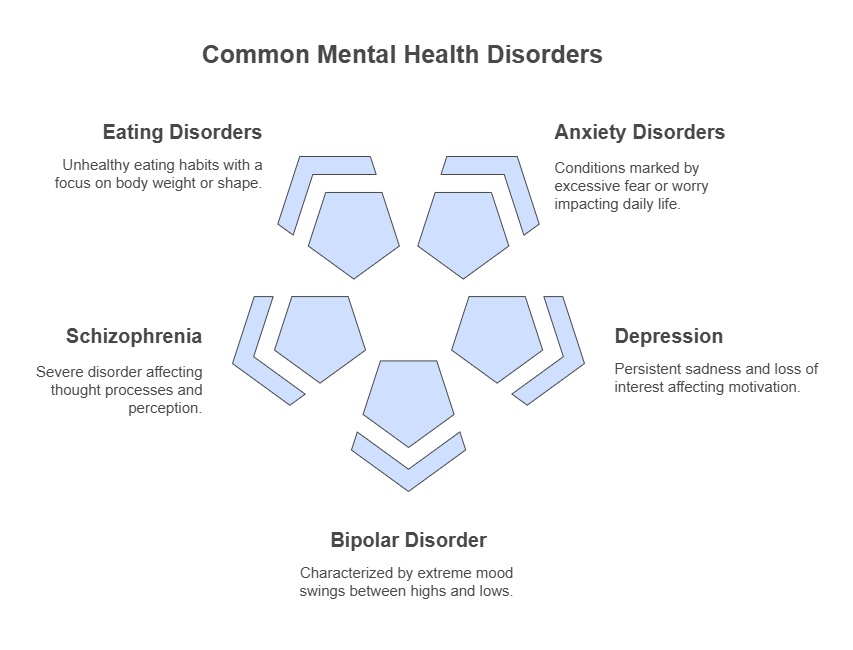
How to Stay Mentally Healthy
Staying mentally healthy involves adopting practices that promote emotional well-being and resilience. Here are several effective strategies:
1. Practice Self-Care
Self-care refers to activities and practices that individuals engage in to maintain their physical, mental, and emotional health. This can include:
- Exercise: Regular physical activity releases endorphins, which can improve mood and reduce stress.
- Nutrition: Eating a balanced diet rich in nutrients can positively impact mental health.
- Sleep: Prioritizing quality sleep is essential for mental and emotional well-being.
2. Build Strong Relationships
Social connections are vital for mental health. Building and maintaining healthy relationships with family, friends, and colleagues can provide support and reduce feelings of isolation. Consider the following:
- Communicate Openly: Share your thoughts and feelings with trusted individuals.
- Seek Support: Don’t hesitate to reach out for help when needed. Support networks can provide comfort and guidance during tough times.
3. Manage Stress
Effective stress management is crucial for maintaining mental health. Techniques to manage stress include:
- Mindfulness and Meditation: Practicing mindfulness and meditation can help reduce stress and promote relaxation.
- Breathing Exercises: Deep breathing exercises can alleviate anxiety and provide a sense of calm.
- Time Management: Organizing tasks and setting realistic goals can reduce feelings of overwhelm.
4. Seek Professional Help
If you’re struggling with mental health issues, seeking help from a mental health professional can be beneficial. Therapists, counselors, and psychiatrists can provide support, guidance, and treatment options tailored to your needs.
5. Engage in Hobbies and Activities
What is Mental Health and How Do We Stay Mentally Healthy?
Mental health is a complex and multifaceted topic that encompasses our emotional, psychological, and social well-being. It affects how we think, feel, and behave, and plays a crucial role in our overall quality of life. Understanding what mental health is and how to maintain it is essential for leading a fulfilling and balanced life.Understanding Mental HealthAt its core, mental health refers to our ability to cope with the everyday stresses of life, build and maintain healthy relationships, and achieve a sense of purpose and fulfillment. It is not just the absence of mental illness, but a state of well-being in which an individual can realize their own potential, cope with the normal stresses of life, work productively, and contribute to their community.Mental health exists on a spectrum, with individuals experiencing varying levels of mental well-being at different points in their lives. Some may struggle with mental health challenges, such as depression, anxiety, or other disorders, while others may enjoy a relatively high level of mental health. It’s important to understand that mental health is not a static condition, but rather a dynamic process that can be influenced by a variety of factors, including genetics, environmental influences, and life experiences.Factors Influencing Mental HealthThere are several factors that can impact an individual’s mental health, both positively and negatively. These include:
- Biological Factors: Genetics, brain chemistry, and other physiological factors can play a significant role in mental health. Certain mental health conditions, such as bipolar disorder or schizophrenia, have been linked to specific genetic and neurological factors.
- Psychological Factors: Our thoughts, emotions, and behaviors can all influence our mental health. Factors like stress, trauma, and negative thought patterns can contribute to the development of mental health issues, while positive coping strategies and a healthy mindset can promote mental well-being.
- Social Factors: Our relationships, social support systems, and the broader social and cultural environment in which we live can also impact our mental health. Strong social connections, a sense of belonging, and a supportive community can all contribute to good mental health, while social isolation, discrimination, and other negative social experiences can have a detrimental effect.
- Environmental Factors: The physical environment in which we live, work, and play can also influence our mental health. Factors such as air quality, access to green spaces, and exposure to toxins or pollutants can all play a role in our overall well-being.
Maintaining Mental HealthMaintaining good mental health is essential for leading a fulfilling and balanced life. Here are some key strategies for promoting and preserving mental well-being:
- Prioritize Self-Care: Engaging in regular self-care activities, such as exercise, healthy eating, and getting enough sleep, can have a profound impact on mental health. Taking the time to care for our physical and emotional needs can help us better manage stress, improve mood, and boost overall well-being.
- Practice Mindfulness and Relaxation: Techniques like meditation, deep breathing, and yoga can help reduce stress, improve focus, and promote a sense of inner calm. Engaging in these practices on a regular basis can have long-term benefits for mental health.
- Build Healthy Relationships: Strong social connections and a sense of community are essential for mental well-being. Investing time and energy into building and maintaining healthy relationships with family, friends, and loved ones can provide a valuable source of support and belonging.
- Seek Professional Help: If you are struggling with mental health challenges, it’s important to seek professional help. This may include working with a therapist, counselor, or other mental health professional to develop a personalized treatment plan and access the support you need.
- Foster a Growth Mindset: Adopting a growth mindset, which involves embracing challenges, learning from mistakes, and continuously striving for self-improvement, can help promote resilience and a positive outlook on life.
- Practice Gratitude: Regularly expressing gratitude and focusing on the positive aspects of our lives can help shift our perspective and promote a greater sense of well-being.
- Engage in Meaningful Activities: Pursuing hobbies, volunteering, or engaging in other activities that bring a sense of purpose and fulfillment can contribute to overall mental health and well-being.
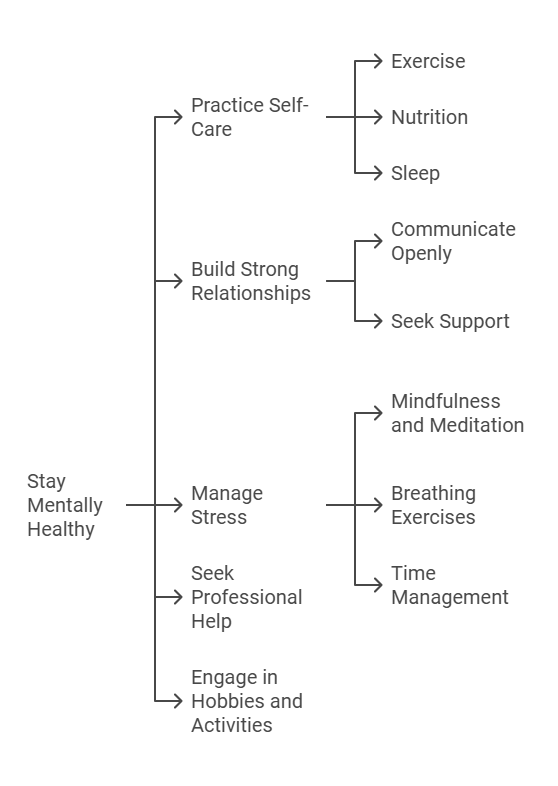
ConclusionMental health is a critical component of our overall well-being, affecting how we think, feel, and interact with the world around us. By understanding the factors that influence mental health and adopting strategies to promote and maintain it, we can cultivate a greater sense of balance, resilience, and fulfillment in our lives. Remember, taking care of our mental health is not a one-time event, but a lifelong journey of self-care, personal growth, and connection with others.

“As the voice behind Radiant Glow Health, we are dedicated to being your ultimate wellness and vitality companion. Our mission is to inspire and guide you on your journey to a healthier and more vibrant life. Join us as we explore holistic health practices and empower you to radiate wellness from within.”
